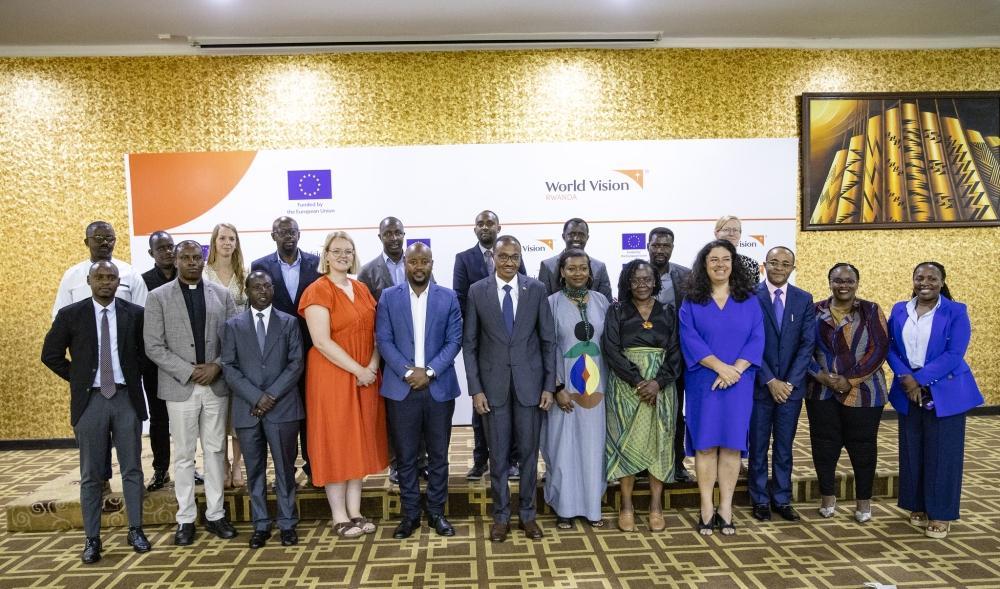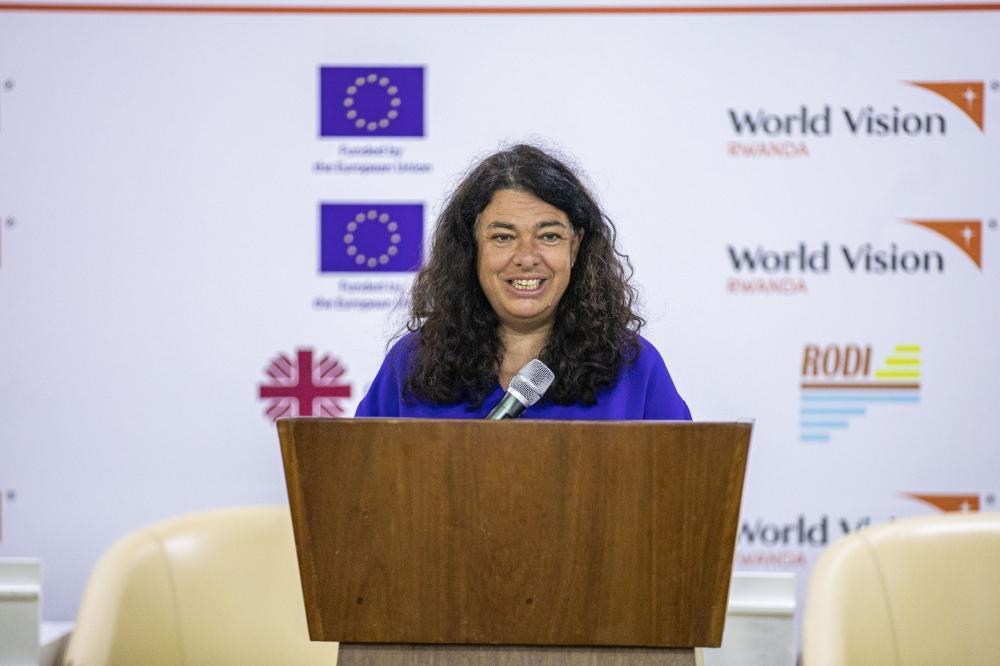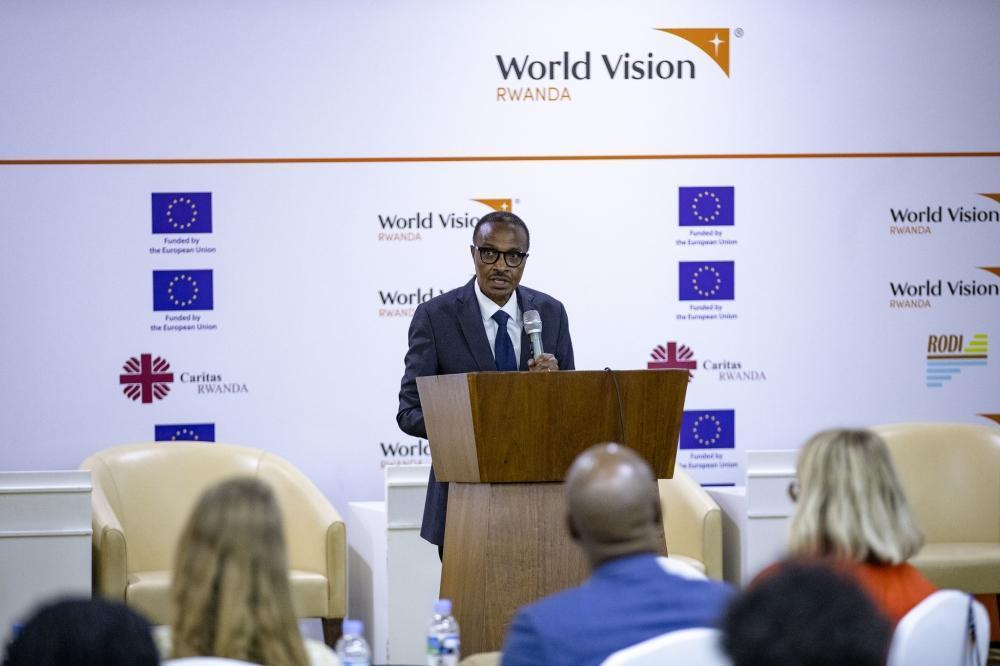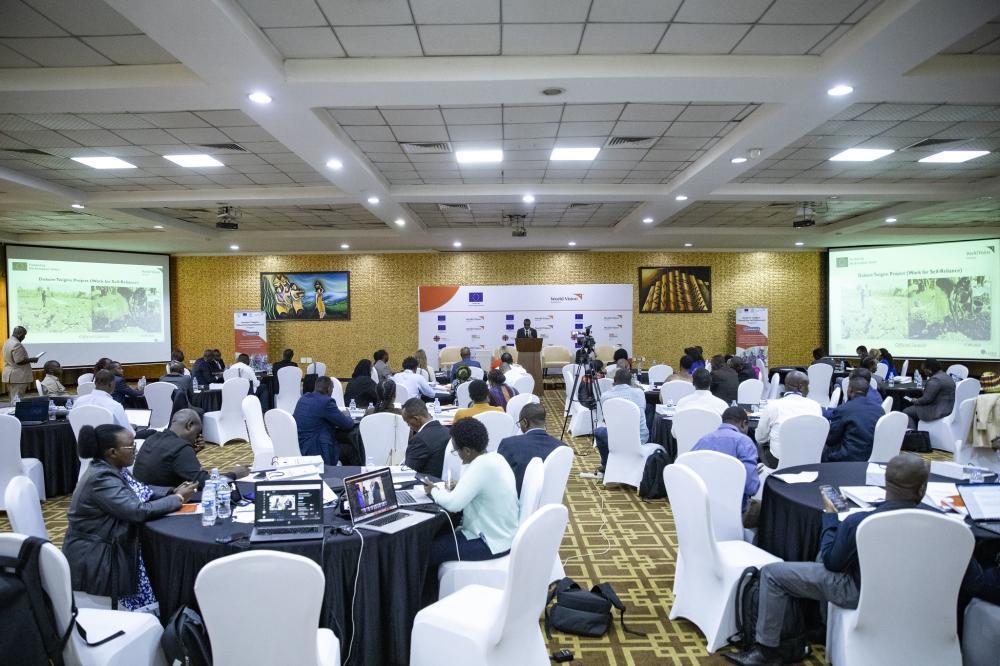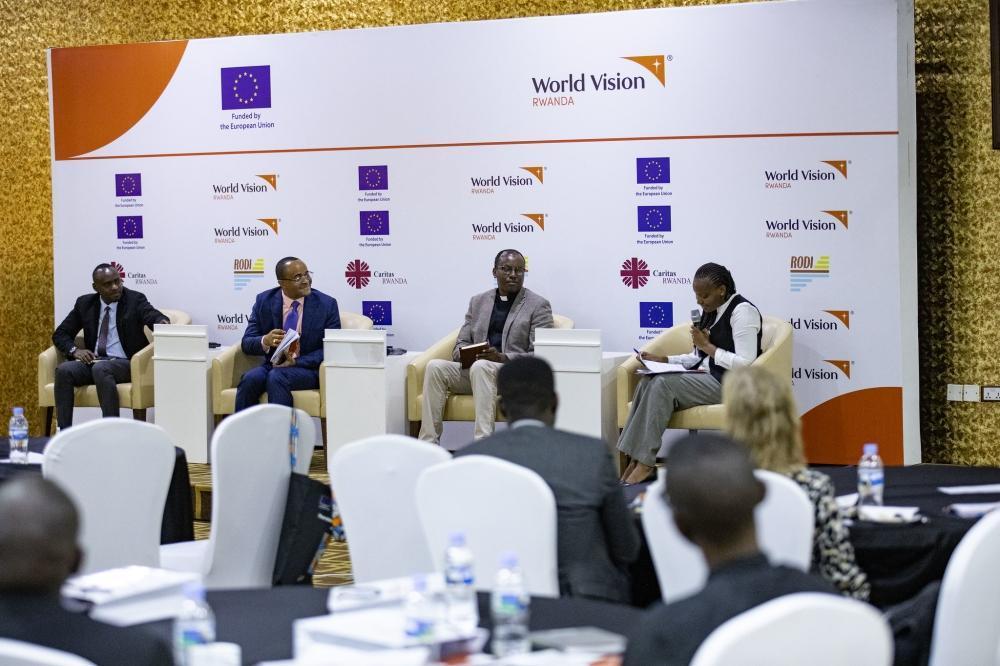Africa-Press – Rwanda. World Vision Rwanda, with funding from the European Union, this week launched a three-year Dukore Twigire project on September 17 alongside their implementing partners, Caritas Rwanda, and Rwanda Organization for Development Initiatives (RODI). This joint effort will directly support 2,133 households and benefit families in refugee and host communities around the Mugombwa, Kigeme, Kiziba, and Nyabiheke refugee camps.
Dukore Twigire will support 70 per cent of refugee and 30 per cent of host community households through integrated livelihood programmes.
Fred Mubangizi, the Project Manager, said outcomes will be built on four key pillars: Social protection — providing income security through consumption support, crisis relief, and access to health and education;
Livelihood promotion to ensure numerous and sustainable income sources with asset or cash transfers, employment linkages, skills training, and market access. Thirdly, financial inclusion, to improve income and risk management through savings, credit, insurance, and financial literacy, and then, social empowerment, to encourage confidence, inclusion, and positive behaviour change through life skills, integration, and coaching, all underpinned by gender equality.
“By bringing together development partners, local organisations, and communities, the Dukore Twigire project demonstrates the power of collaboration to create long-lasting change,” noted Mubangizi.
It is also aligns with World Vision Rwanda’s 2026 to 2030 strategy, and is expected to build the capacity of up to 15 local Civil Society Organizations as agents of change, creating durable solutions for forcibly displaced populations and empowering families to rise from extreme poverty, with the ultimate goal of ensuring that refugees and host communities move beyond survival to truly thrive.
The initiative supports Rwanda’s national strategies on social protection, refugee inclusion, and sustainable livelihoods, while aligning with the government’s ambition to enable half of all refugee households to achieve self-reliance by 2030.
“This is a remarkable opportunity to transform this reality,” said Pauline Okumu, National Director of World Vision Rwanda. “Together with our partners, we will empower households in refugee camps and host communities to move beyond survival toward resilience, dignity, and self-reliance.
“We appreciate the EU’s commitment and investment, which will make a huge difference in the lives of thousands of the most vulnerable children and families in Rwanda,” she added.
Belen CALVO UYARRA, Ambassador of the European Union to Rwanda, speaks during the event on September 17
According to Belen CALVO UYARRA, Ambassador of the European Union to Rwanda, “This project builds on the European Union’s longstanding commitment to refugee protection across the Great Lakes region. The EU has long recognized Rwanda’s progressive refugee policies, and we are proud to support the Government’s vision, to transition 50% of refugee households in Rwanda from dependency on humanitarian assistance to self-reliance by 2030 in line with the new Refugee Sustainable Graduation Strategy under formulation. The project we are launching today with World Vision is a practical step in
this direction. It will empower refugees, and the communities that host them, to build resilient livelihoods, access inclusive services, and contribute meaningfully to Rwanda’s development. It also complements our broader efforts under the EU’s humanitarian-development-peace nexus approach, working together across sectors to create lasting change. This is especially important in times of increased pressure on already stretched resources and humanitarian systems.”
Refugees weigh in
Olive Mukobwajana Butera, Vice President of Mugombwa Refugee Camp in Gisagara District, which hosts approximately 13,000 refugees, said the project could address some of the challenges refugees and host communities face.
“I don’t expect the project to solve all our problems, but since we will have 70 per cent of the budget, we are expecting positive results that will yield tangible benefits,” said Mukobwajana.
“We’re ready for everything, especially collaborating and sharing skills with our fellow refugees. We will also mobilize them to prepare and stay committed on this journey of resilience and self-reliance,” she added.
Bosco Maniragaba, President of Nyabiheke Refugee Camp in Gatsibo District, said that the project, especially its name, would motivate people to “walk the talk.” Since some members had already started, it would be easier for them to pursue their ventures to full capacity.
“About 250 people in our community work closely with the host communities in harmony. We have joined savings groups, agricultural initiatives, joint cooperatives, and other activities that contribute collaboratively to both sides,” he noted.
Maj. Gen (Rtd) Albert Murasira, Minister in Charge of Emergency Management, delivers his speech during the launch of a three-year Dukore Twigire project on September 17. Photos by Dan Gatsinzi
Maj. Gen (Rtd) Albert Murasira, Minister in Charge of Emergency Management, noted that Rwanda today hosts approximately 137,000 refugees from neighbouring countries and asylum seekers. Over 90 per cent live in camps and depend on humanitarian assistance.
“We are experiencing a critical development where we have worldwide a non-bracelet funding crisis affecting humanitarian interventions across the globe, in the region, and in Rwanda in particular. This leads to systematically changing humanitarian approach and putting more emphasis on the development-led intervention, and building the economic capacity of refugees and enabling them to be self-resilient,” he noted.
“We commend the initiative, and this is an important step in creating real pathways to self-reliance. This strategy will guide our collaborative efforts, time efficiency, and build resilient communities,” he said.
By bringing together development partners, local organizations, and communities, the Dukore Twigire Project demonstrates the power of collaboration to create long lasting change.
World Vision Rwanda, with the European Union, launched a three-year Dukore Twigire project on September 17.
For More News And Analysis About Rwanda Follow Africa-Press

